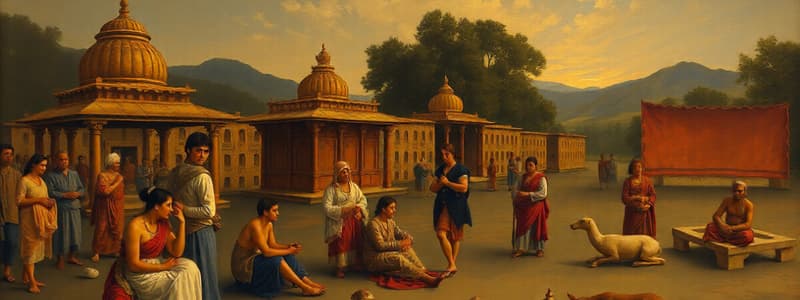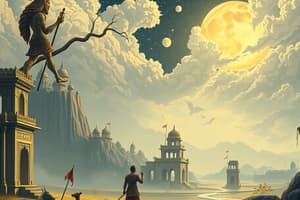Podcast
Questions and Answers
What is a major difference between the Indus Valley civilization and the civilizations of Egypt and Mesopotamia?
What is a major difference between the Indus Valley civilization and the civilizations of Egypt and Mesopotamia?
- Indus Valley civilization had significant evidence of warfare
- Indus Valley cities lacked large temple structures (correct)
- Both Egypt and Mesopotamia lacked centralized authority structures
- Egypt had more standardized artefacts than Harappa
Which of the following factors indicates the potential existence of a centralized authority in the Harappan civilization?
Which of the following factors indicates the potential existence of a centralized authority in the Harappan civilization?
- Multiple independent rulers in each city
- Cultural homogenization across regions (correct)
- Presence of a centralized temple structure
- Significant number of weapons found at sites
What evidence suggests that Harappa might have been governed by a class of merchants?
What evidence suggests that Harappa might have been governed by a class of merchants?
- Presence of large agricultural estates
- The existence of extensive fortifications
- Existence of temple complexes
- Lack of material evidence for warfare (correct)
Which of the following statements reflects the economic priorities of the Indus Valley civilization?
Which of the following statements reflects the economic priorities of the Indus Valley civilization?
What aspect of the Harappan script remains uncertain among scholars?
What aspect of the Harappan script remains uncertain among scholars?
Which assertion accurately reflects the debate over the existence of a state in the Indus Valley civilization?
Which assertion accurately reflects the debate over the existence of a state in the Indus Valley civilization?
What common feature exists between the Indus Valley civilization and other ancient civilizations, despite their differences?
What common feature exists between the Indus Valley civilization and other ancient civilizations, despite their differences?
Which factor could be considered a potential indicator against the existence of a significant state in the Harappan civilization?
Which factor could be considered a potential indicator against the existence of a significant state in the Harappan civilization?
Which statement most accurately reflects the economic structure of the Indus Valley Civilization compared to Mesopotamia and Egypt?
Which statement most accurately reflects the economic structure of the Indus Valley Civilization compared to Mesopotamia and Egypt?
What was a primary characteristic of the sculptures found in the Indus Valley Civilization?
What was a primary characteristic of the sculptures found in the Indus Valley Civilization?
How does the artistic style of the 'Priest-King' and the 'Dancing Girl' differ?
How does the artistic style of the 'Priest-King' and the 'Dancing Girl' differ?
What unique feature does the bronze statue of the 'Dancing Girl' possess?
What unique feature does the bronze statue of the 'Dancing Girl' possess?
Which artifact is indicative of high craftsmanship and social status within the Indus Valley Civilization?
Which artifact is indicative of high craftsmanship and social status within the Indus Valley Civilization?
Where was the stone bust known as 'Priest-King' discovered?
Where was the stone bust known as 'Priest-King' discovered?
What was a notable factor about the stone sculptures from the Indus Valley?
What was a notable factor about the stone sculptures from the Indus Valley?
Which aspect of the lost-wax technique is accurately described?
Which aspect of the lost-wax technique is accurately described?
What is the approximate number of signs in the Harappan script?
What is the approximate number of signs in the Harappan script?
What type of script was used in Mesopotamia?
What type of script was used in Mesopotamia?
Which dialect is suggested to be potentially related to the Harappan language?
Which dialect is suggested to be potentially related to the Harappan language?
Which characteristic is true of Harappan civilization compared to Mesopotamian civilization?
Which characteristic is true of Harappan civilization compared to Mesopotamian civilization?
Which statement distinguishes the recording method of the Harappans from that of the Mesopotamians?
Which statement distinguishes the recording method of the Harappans from that of the Mesopotamians?
Which conclusion can be drawn about the existence of Harappan civilization after 1900 BCE?
Which conclusion can be drawn about the existence of Harappan civilization after 1900 BCE?
What distinguishes the engineering skills of the Harappan civilization?
What distinguishes the engineering skills of the Harappan civilization?
How does the Harappan script compare with Mesopotamian and Egyptian scripts?
How does the Harappan script compare with Mesopotamian and Egyptian scripts?
Study Notes
Political System
- Theories suggest multiple political structures: a single centralized state, multiple rulers for different cities, or an egalitarian society without rulers.
- Evidence indicates possible centralization through cultural homogenization, likely an oligarchy.
- Absence of religious rulers; no temples found, contrasting with low Mesopotamia.
- Emphasis on commerce over conquest; minimal weapon presence supports this.
- Harappa was likely ruled by a class of merchants rather than warlords.
Existence of the State
- Debates exist about the state's presence, supported by evidence of communication systems and standardized artifacts.
- Site specialization and labor mobilization hint at a structured state.
- Trading outposts such as Shortughai indicate economic activities.
- Lack of evidence for priest-kings, slaves, or a standing army suggests a more egalitarian society.
- Harappan script features around 400 signs, with potential connections to the modern Brahui language.
Comparison with Other Civilizations
- Harappan civilization had planned towns and superior drainage systems unlike the haphazard growth seen in Mesopotamia and Egypt.
- Unique architectural features include rectangular houses with bathrooms, though this was missing in contemporary civilizations.
- Harappans produced distinctive pottery and seals, while Mesopotamians used cuneiform script and Egyptians used hieroglyphics.
- Harappan writing predominantly on seals, versus Mesopotamian clay tablets and Egyptian papyrus.
Technology
- Advancements in metallurgy included techniques for copper, bronze, lead, and tin; iron was not utilized.
- Evidence of engineering skills seen in dock construction and precision in measurements.
- Weights and measures used in ancient texts show similarities to those from the IVC period.
- Social structure displayed some differentiation, but overall lacked the economic divides present in Mesopotamian and Egyptian societies.
Sculptures
- Limited sculptures found, highlighting craftsmanship; major specimens are from Mohenjo-Daro and nearby sites.
- Notable figures include the 'Dancing Girl' which reflects artistic talent, mostly representing human and animal forms.
- Key findings like the Priest King bust suggest significance and status in artistry; various bronze and stone figures were discovered.
Major Sculptural Findings
- The Priest King statue from Mohenjo-Daro indicated high societal status; elegant attire and missing limbs suggest symbolic representation.
- The 'Dancing Girl' bronze statue exemplified dynamic art through the lost-wax technique and stood about 11 cm high.
Lost-Wax Technique
- A complex metal casting process whereby a wax model is created, molded, melted away, and replaced by molten metal to form artistic items.
Artistic Style
- Artistic expressions varied significantly, reflecting diverse styles and techniques between major figures like the Priest King and Dancing Girl, displaying cultural richness within the Harappan civilization.
Studying That Suits You
Use AI to generate personalized quizzes and flashcards to suit your learning preferences.
Related Documents
Description
This quiz examines the political system of the Indus Valley Civilization, focusing on the theories regarding its governance. It encompasses aspects like the standardization of settlements and artefacts. Test your knowledge of this ancient civilization's organization and societal structures.





